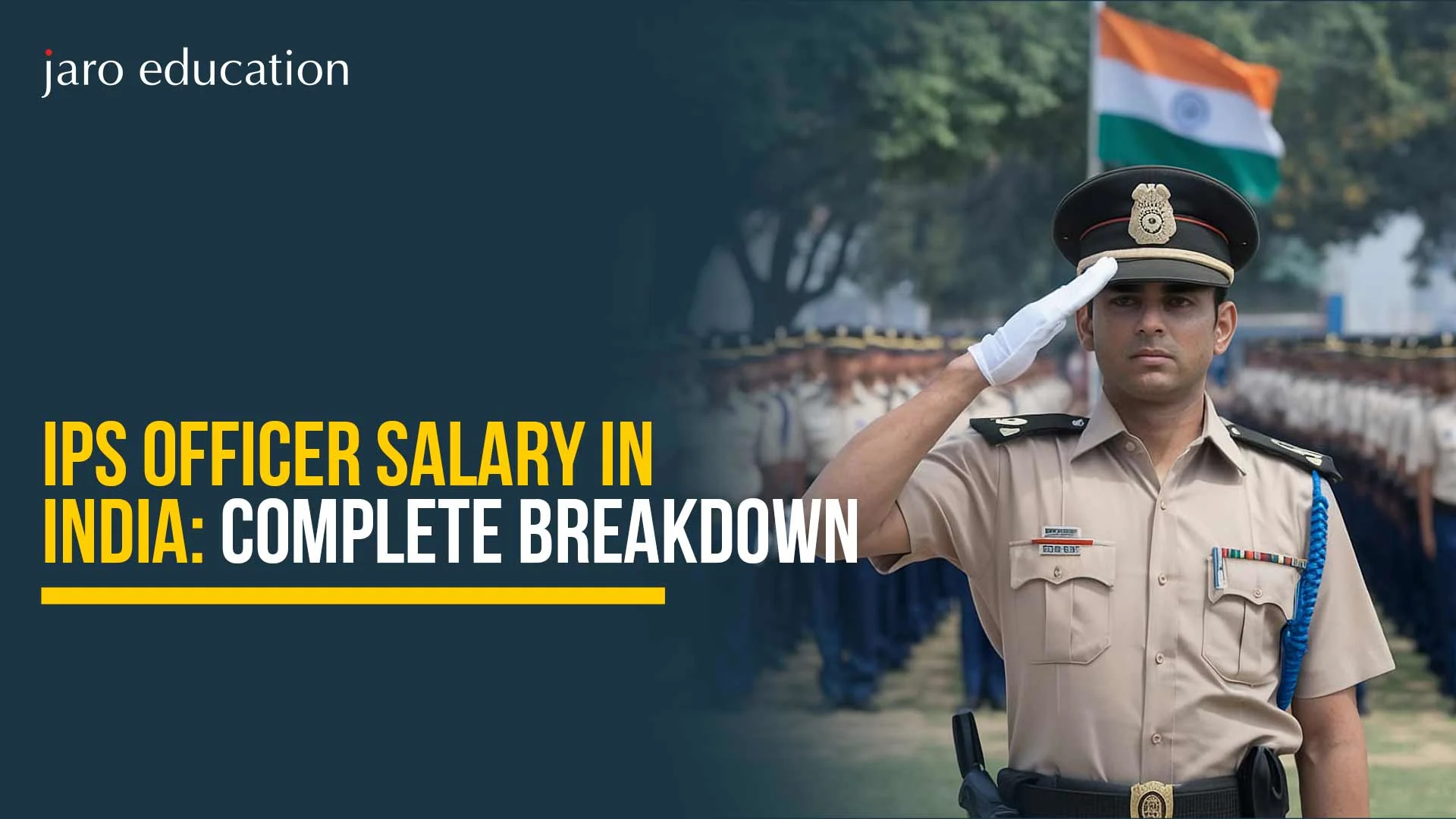IPS Officer Salary in India: Complete Breakdown
Table of Contents

Are you dreaming of a career in law enforcement that brings a challenging yet prestigious position with a competitive salary? If yes, the Indian Police Service(IPS) might be the right career option for you. Being one of the most esteemed and challenging civil services in India, being an IPS officer means you will be responsible for preventing crimes, maintaining law and order, and ensuring the safety within society. In fact, one of the major key factors after IPS officer salary that attracts many individuals to become an IPS officer is the benefits offered by the position.
Furthermore, an IPS officer’s salary under the 7th Pay Commission varies based on rank and experience. However, the average salary lies between INR 56,000 and INR 2,25,000 per month. Thus, whether you are an aspiring candidate who wants to join the IPS or are curious about the pay, this highlights the structure of the IPS officer’s salary for 2025. Read out to learn more.

*ncertbooks.guru
IPS Officer Salary Per Month Structure
The Indian Police Service (IPS) is a reputable career in which candidates are required to clear the UPSC (Union Public Service Commission). After that, selected candidates are then sent for training as IPS officers, and after their completion, they are first appointed as the Assistant Superintendent of Police (ASP). IPS rank is considered the basis for salaries and benefits provided to the chosen officer, including medical expenses, allowances for housing, and, of course, an official vehicle. After a few years, depending upon their work and commitment towards the service, they get promoted to higher ranks in the Indian Police Service.
The table below represents the structure of an IPS officer’s salary per month:
| IPS Salary Per Month | |
| Salary Component | Monthly Salary |
| Basic Pay | INR 56,100 |
| Grade Pay | INR 6,600 |
| Dearness Allowance (DA) | 12% of Basic Pay |
| House Rent Allowance (HRA) | 8% of Basic Pay |
| Transport Allowance (TA) | INR 3,000 |
| Gross Salary | INR 64,000 |
IPS Officer Ranks and Salary
In India, there are around 8 ranks of Indian Police Service officers that start with Deputy SP. However, each rank has its own responsibilities and years of service to the country. This is where IPS stands as the unique insignia. Let’s look at the top IPS officer salary in India based on their rank, along with their roles:
| Rank | Salary | Role Description |
|---|---|---|
| Deputy Superintendent of Police (DSP) | INR 56,100 | It is the second rank and is similar to those in the Indian State Police Gazetted Officers section. They are mainly responsible for managing law and order in an assigned district. |
| Additional Superintendent of Police (Addl. SP) | INR 67,700 | It is a higher rank than a DSP and serves as second-in-command in a district. |
| Superintendent of Police (SP) | INR 78,800 | They have a smaller district under their control and are mainly responsible for overseeing law and order. SP features the Ashoka emblem and star on epaulettes, with 'IPS' below. |
| Senior Superintendent of Police (SSP) | INR 1,23,100 | They have control of multiple districts to oversee law and order. |
| Deputy Inspector General of Police (DIG) | INR 1,31,100 | They are responsible for leading the Indian Police in a zone, which may vary from multiple ranges, and wear Gorget patches on their collars. |
| Inspector General of Police (IGP) | INR 1,44,200 | Being IGP is considered to be the 3rd highest rank in IPS, and officers are primarily responsible for maintaining law and order in a state. |
| Additional Director General of Police (ADGP) | INR 2,05,400 | ADGP mainly supervises a specific department or branch. In some states, this rank is equivalent to the Commissioner of Police. |
| Director General of Police (DGP) | INR 2,25,000 | The highest-ranking officer and head of the department, such as the Criminal Investigation Department (CID) |
IAS vs IPS Salary
Now, some of you must be wondering about the IAS salary. Let us tell you, the approximate IAS offers a salary range from Rs. 56,100 to Rs. 2,50,000 per month. Whereas an IPS officer’s salary per month ranges from Rs. 56,100 to Rs. 2,25,000, depending on their seniority, with their higher pay scale attributed to their roles and responsibilities.
| Salary Scale | IAS Officer Salary | IPS Officer Salary |
|---|---|---|
| Junior Scale | Rs 56,100 | Rs 56,100 |
| Senior Time Scale | INR 67,700 | Rs 67,700 |
| Junior Administrative Grade | INR 78,800 | N/A |
| Selection Grade | Rs 1,18,500 | Rs 1,18,500 |
| Super Time Scale | Rs 1,13,100 | Rs 1,13,100 |
| Above Super Time Scale | INR 1,44,200 | Rs 1,44,200 |
| Apex Scale | Rs 2,50,000 | Rs 2,25,000 |
| Cabinet Secretary Grade | Rs 2,50,000 | Rs 2,25,000 |
Benefits and Perks of Being an IPS Officer
Now we have already answered what the salary of an IPS officer is, but here are the main perks that officers enjoy in this career field. There is a wide range of benefits and allowances that make the job even more rewarding:
- Dearness Allowance (DA): It provides IPS officers with protection against the erosive force of inflation so that their salary retains its value over time.
- Travel Allowance (TA): Allows for covering all travel expenses when the officer is on their authorised duties, so that the officer can do their official work without cost to him/herself.
- House Rent Allowance (HRA): Allowed for covering costs related to housing, depending on the designated place of posting and locality.
- Residential Quarters: Government quarters are allotted to many CHIEF OFFICERS for safe and comfortable accommodations that will be at no cost to the officer or the taxpayer.
- Official vehicle: IPS Officers are also authorised to receive an official vehicle for official work and for limited personal use by the officer.
- Dedicated staff: Most IPS officers will have staff assigned to them, either personally or as part of a team, for support in achieving their work responsibilities.
- Gratuity: A lump sum is given upon retirement, providing financial support during post-service years.
- Provident Fund (PF): This portion of the CHIEF OFFICER’S/IPS officer’s salary will be a contributory payment to the retirement plan pension scheme as it relates to long-term financial sustainability.
- Leave Encashment: Unused Leave can be encashed and, in some respects, considered an additional reward for working hard, as it converts unused leave time into a monetary benefit at the end of service.
- CGHS Medical Facilities: Eligible IPS officers and their family members will have access to comprehensive medical facilities /health care under CGHS management through authorised CGHS coverage.
The Bottom Line
Now that you understand the IPS officer salary better, it’s important to note that salary should not be the only motive to be an aspiring IPS officer. It is indeed a prestigious and challenging career opportunity that requires your commitment, loyalty, and dedication to serve the country and people by following the law and order. An IPS officer should mainly focus on their leadership qualities, sense of duty, and integrity, as these are the main points to have a successful career in the Indian Police Service.
Frequently Asked Questions
What is the starting salary for an IPS officer?
The Starting IPS officer’s salary per month is INR 56,100. However, with other benefits such as house allowances, Dearness Allowance (DA), and transport allowance, the total salary may vary between INR 80,000 to INR 90,000.
How does the IPS officer's salary increase in their career?
The IPS officer’s salary range depends on promotions. Note that each promotion gives you a higher basic pay along with an increase in allowances, which raises the overall monthly salary.
How much does an IPS officer in the Selection Grade earn?
In the Selection Grade, an IPS officer’s salary is around INR 1,18,500. In addition, by adding all allowances, the IPS officer’s salary ranges from ₹1,60,000 to ₹1,70,000
What is the highest salary an IPS officer can earn?
The highest salary of an IPS officer in India is at the Director General or Higher Administrative Grade level, where the basic pay is ₹2,05,400.












![Top-Career-Opportunities-After-PhD-in-India-[2025]](https://jaro-website.s3.ap-south-1.amazonaws.com/2025/10/Top-Career-Opportunities-After-PhD-in-India-2025.webp)




